|
|
|
|
|
|
|
|
|
|
#1 |
|
Бабайка
Город: Киев
Touareg GP 3.0 V6TDI
Регистрация: 19.03.2007
Сообщений: 3,717
Поблагодарил(а): 2,830
Благодарностей: 10,312
Изображений в галерее: 297
Репутация:
17580
           |
Touareg Hybrid
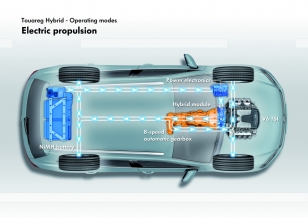 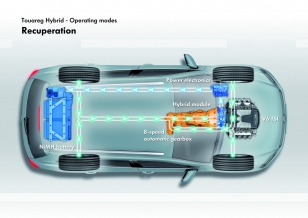 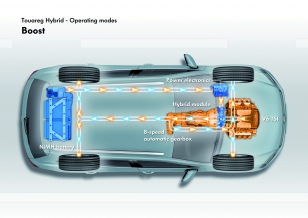 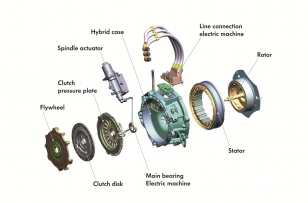  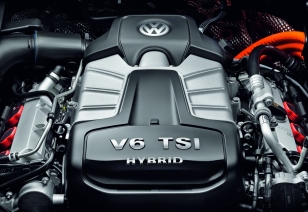  Информационный блок Touareg Hybrid can drive up to 50 km/h on pure electric power The Touareg will also be the first Volkswagen SUV to be offered in a hybrid version (V6 TSI plus E-motor). When the V6 TSI and E-motor work simultaneously (boosting), a total power of up to 279 kW/380 PS is generated with a maximum torque of 580 Newton-metres as measured on the dynamometer. Yet, it sets standards among fully off-road capable SUVs with petrol engines with a fuel consumption value of just 8.2 litres fuel per 100 kilometres. The Touareg Hybrid can be driven up to 50 km/h in purely electric mode - emissions-free. Like all Touaregs, the hybrid version is also designed for trailer payloads of up to 3.5 tonnes. Fuel economy and emissions values are also significantly improved on the conventionally powered Touareg versions. All engines satisfy the Euro-5 emissions standard and also have a new thermal management system to guarantee that the proper operating temperature is reached quicker, which is important in attaining better fuel economy especially on short driving trips. Touareg Hybrid with 380 PS System Power: Eight-cylinder performance with four-cylinder fuel economy Turbocharged V6 TSI and electric motor bring fuel consumption down to 8.2 l/100 km! V6 TSI plus E-motor develop a total of 580 Newton-metres of torque! Wolfsburg / Florence, March 2010. With its low combined fuel consump¬tion of 8.2 l/100 km, the all-wheel drive Touareg Hybrid sets new stan¬dards among genuine SUVs with petrol engines. CO2 emissions are equally low: 193 g/km. The Hybrid drive, the new top engine choice, combines the power of a classic eight-cylinder engine with the fuel economy of a six or four-cylinder engine. Therefore, it is replacing the previous V8 petrol engines in Europe and America, continuing the successful Volkswagen strategy of downsizing. Naturally, the Touareg Hybrid fulfils requirements of the Euro-5 emissions standard in Europe and ULEV2 in the USA. The SUV reaches a top speed of 240 km/h and accelerates to 100 km/h in just 6.5 seconds. The drive unit of the Touareg Hybrid primarily consists of a super¬charged V6 TSI (direct-injection petrol engine with 245 kW/333 PS), an 8-speed automatic transmission customised for hybrid, towing vehicle and off-road use, including torque converter, final drive units and cen¬tre differential, as well as the Hybrid Module integrated between the internal combustion engine and automatic transmission. This module - the "heart of the hybrid" - contains an E-motor (34.3 kW/46 PS) and a disengagement clutch. The Hybrid Module has a diameter of 400 milli-metres, is only 145 millimetres long and weighs just 55 kilograms. When the V6 TSI and E-motor work simultaneously at full power (boosting), a system power output of up to 279 kW/380 PS and maxi¬mum torque of 580 Newton-metres are delivered. The drive energy for the E-motor is stored in a Nickel Metal-Hydride (Ni-MH) battery at the rear of the Touareg, stated more precisely in the spare wheel recess. With its nominal voltage of 288 Volt, the battery has an energy capacity of 1.7 kilowatt-hours (kWh) and a peak output power of 38 kW. The energy stored in the battery is sufficient to drive the Touareg over a distance of about two kilometres and up to a speed of 50 km/h in pure electric mode. The interplay of the individual system components is "co-ordinated" by a Hybrid Manager. Parallel hybrid ideal for SUV use Volkswagen deliberately chose a parallel hybrid drive configuration for the Touareg. In contrast to other possible hybrid systems, it assures excellent off-road performance and unlimited continuous climbing ability. In addition, with its maximum trailer payload of up to 3.5 tonnes, the Touareg is also an ideal towing vehicle in the hybrid version. Moreover, the parallel hybrid is more efficient than alternative hybrid concepts on long-distance and motorway journeys. Compared to a conventional SUV of the same size and power, the hybrid concept delivers fuel savings of up to 25 percent in city driving. In combined mode driving - a mix of city, highway and motor¬way drives - development engineers calculate an average saving of 17 percent. Essentially, four parameters were exploited to achieve this fuel efficiency on the Touareg Hybrid: Electric driving: Emission-free driving (as described, up to 50 km/h) by pure electric power reduces petrol consumption. In this case, the V6 TSI is not only shut off, but is also disengaged from the 8-speed auto¬matic by a disengagement clutch to avoid drag torque losses. Coasting: As soon as the driver releases the accelerator pedal, the V6 TSI is disengaged from the transmission. This is even possible at higher speeds (up to 160 km/h), i.e. on the motorway as well. The Touareg "rolls" significantly longer, since drag torque losses are eliminated. When drivers adopt an anticipatory style of driving, this has a direct positive impact on fuel economy. Regenerative braking: During braking, the E-Motor - now operating as a generator - recovers kinetic energy, which is then stored in the high-voltage battery (NiMH battery). Stop-Start system: All V6 versions of the new Touareg are equipped with a standard Stop-Start system - and naturally this also includes the Touareg Hybrid. The Stop-Start system integrated in the power-train improves fuel economy, especially in urban areas and stop-and-go traffic. The Hybrid Manager - the brain that directs the drive sources The individual components are networked by a Hybrid Manager. Integrated in the engine controller, it communicates via the CAN bus lines with units such as the automatic transmission, high-voltage battery and the so-called power electronics. The latter manages the energy flow between the electric motor and the high-voltage battery. Besides a pulse-controlled inverter to control the E-motor, the power electronics also contains a DC/DC converter. It is responsible for supplyi ng the 12V electrical system from the E-motor or the high-voltage battery. Depending on the charge state of the battery, vehicle speed and other vehicle-specific parameters, the Hybrid Manager automatically analyses and chooses the ideal operating strategy - in fractions of a second. This operating strategy is a key component of the software for controlling the powertrain. Because it networks the systems to optimise utilisation of the electrical energy available in the battery for maximum possible efficiency. This is anything but trivial. In contrast to the fuel tank, the electrical energy storage device - the battery - is not only discharged while driving; it is charged too. So, optimal operation of the Touareg Hybrid involves many short phases of use and storage of electrical energy and therefore continually alternating operating modes. E-motor brings the V6 TSI back in motion Whenever the V6 TSI is not needed to operate the Touareg, the disengage¬ment clutch in the Hybrid Module disengages, and the motor is shut off - without the driver noticing. If the operating mode is switched again, and the V6 TSI is then re-started, this too is imperceptible to the driver. And that is how it should be. Because the quality with which the six-cylinder is started during the drive affects the impression of the overall vehicle's comfort. Essentially, the operating strategy's engine start request is based on feedback from electric driving or braking regene¬ration. The control system then initiates - in fractions of a second - an energy flow sequence in which the re-start is coordinated as a kind of drive technology "handshake" between the V6 TSI, disengagement clutch, E-motor and transmission. And this is how the V6 is re-started: If there is an engine start request, the torque converter lockup clutch of the automatic is made to slip, and the speed of the E-motor is increased to the target value specified by the transmission control module. Only then does the engine controller get the enable to activate the disengagement clutch. As the clutch starts to engage, the V6 TSI is "push started" by the E-motor and is started by an enable of fuel injection and ignition. Then the disengagement clutch is disengaged again, so that the combustion engine can run up to its target speed nearly load-free. The E-motor's torque is increased to the momentary torque transmitted by the disengagement clutch during the "push start" process, and after the combustion engine is started, E-motor torque is reduced as the combustion engine's torque rises. This is how the transmission's input torque and associated wheel torque are maintained at the target value desired by the driver. When the speeds of the E-motor and V6 TSI match, the disengagement clutch and then the torque converter lockup clutch are re-engaged. Finished. This starting sequence, always run the same way, can now be scaled between a comfort-oriented and dynamics-oriented range by the Hybrid Manager, which varies the duration of the individual sub-processes. This is how the different driver inputs - detected from accelerator pedal activations - are put into effect. Kinetic energy is ideal for charging the battery Incidentally, the recovery of braking energy - or regenerative braking - represents one of the best types of battery charging in terms of its effect on overall fuel economy. It is even more energy-efficient to di¬rectly maximise the kinetic energy of the coasting vehicle by mini¬mising drag torque in the drivetrain. To do this, the V6 TSI is decoupled from the drivetrain and shut off during coasting (or "sailing") by ope¬ning the disengagement clutch, so that its drag losses do not affect the vehicle's overall efficiency. The energy-generating torque of the E-motor is regulated to just cover the power needs of auxiliary consu¬mers. As already mentioned, this coasting mode is essentially possible up to vehicle speeds of 160 km/h. If the driver brakes the Touareg by pressing the brake pedal, the motion of the E-motor, now acting as a generator, is converted into electrical energy and is stored in the high-voltage battery. It is then available for the next acceleration phase. Yet, even the best electronic control of the hybrid components is only effective if the drive sources are operating efficiently. It is the V6 TSI that guarantees this efficiency on the new Touareg Hybrid. The V6 TSI in detail The Touareg's remarkably rpm-friendly and responsive V6 TSI develops its noted 245 kW/333 PS of power between 5,500 and 6,500 rpm. At a low 3,000 rpm it generates a maximum torque of 440 Newton-metres from the 2,995 cm3 displacement of its six-cylinder with intercooler. This maximum torque is maintained at a constant level over a very extended range of engine speed. And indeed up to 5,250 rpm. So it can be said that the V6 TSI offers the power and torque of an eight cylin¬der, but is significantly more fuel efficient. The already very dynamic torque characteristic enabled by the supercharger becomes even more fascinating when the E-motor is used at low speeds. That is because the torque with boosting essentially jumps to 580 Newton-metres from a standstill - a dynamic side effect of the system designed for efficiency. To further increase this efficiency, a switchable engine water pump is used on the V6 TSI - it is used on all other engines of the new Touareg as well. The switchable pump assures very quick warm-up of the engine. The pump is integrated in the vehicle's overall thermal management system. Meanwhile, cooling of the charge air is accomplished by a separate low-temperature cooling loop with its own reservoir and by a heat exchan¬ger integrated in the supercharger module. This loop has two separate coolers in series. To further reduce fuel consumption, the V6 TSI also has softer valve springs and piston rings as well as chain and belt ten-sioners with lower pretension. Two quickly responding three-way catalytic converters located near the engine handle emissions control. The high-voltage battery in detail The Nickel Metal-Hydride (Ni-MH) battery used in the Touareg Hybrid reflects today's best available energy storage technology in automobiles that offers unproblematic operation. Supporting the use of the high-performance Ni-MH battery are its functional safety and ruggedness - studied and proven for years now - and its significant cost advan¬tages. The high-voltage battery is housed in a space-saving manner in the area of the original spare wheel recess. It consists of a total of 240 individual cells, as already mentioned generates a voltage of 288 Volt and offers an energy density of 1.7 kWh. The high-voltage battery is maintained within an optimal temperature range by an auxiliary duct integrated into the Touareg's interior ventilation system and two separate fans. A Battery Manager continuously monitors the charge by comparing data with the Hybrid Manager. Traction lines connect the battery to the power electronics located next to the motor in the front of the car; they supply the E-motor with energy or - in the reverse direction - they charge the battery via the E-motor that then acts as a generator during braking (regenerative braking) or by the V6 TSI (via load point shifting). In case of a crash, the high-voltage battery is protected by a battery protection box. The entire battery system - including this box and the ventilation system - weighs 79 kilograms. The 8-speed automatic is an ideal match for the Hybrid drive In adapting the 8-speed automatic to the Touareg Hybrid, it was possible to utilise 80 percent of all existing transmission parts. The reason: important auxiliary hybrid elements such as an electric oil pump or a heat exchanger were essentially introduced in all versions with the new transmission. Modifications were made in the area of the torque converter housing and at the interface between the torque converter and the Hybrid Module. Transmission control had to be modified signi¬ficantly, especially to attain an optimum of shifting comfort during downshifting in the regenerative braking phases and during restart of the V6 TSI while driving. After just a few hundred metres of driving with the Touareg Hybrid it is easy to see that all of these objectives have been achieved. Steering, heating, braking - how it works without the V6 TSI Ensuring that the Touareg Hybrid can also satisfy all convenience and safety-related functions in pure E-mode too, various components had to be fully re-developed. The SUV has electro-hydraulic power steering, for example, which does not rely on the servo pump driven by the internal combustion engine. Instead, in this case an electric servo pump supplies the necessary hydraulic pressure. An auxiliary electric vacuum pump that is used during electric driving guarantees that the vacuum supply required by the brake booster is maintained. In addition, an electric high-voltage air conditioning compressor in the Touareg Hybrid assures pleasant interior temperatures even when the V6 engine is shut off. |
|
Последний раз редактировалось ADDEN; 21.03.2010 в 21:20. Причина: перенесено |
|
|
|

|
| Поблагодарили: |
|
|
|
|
|